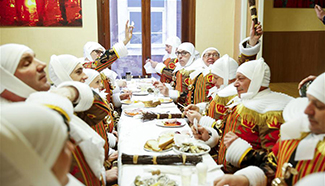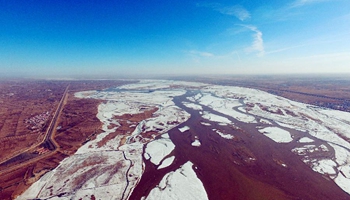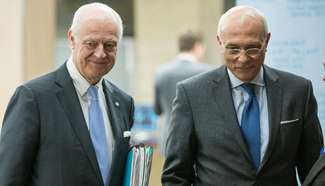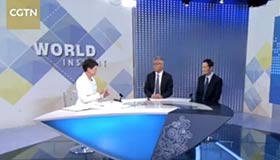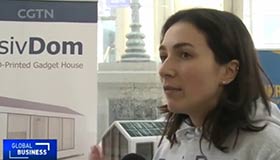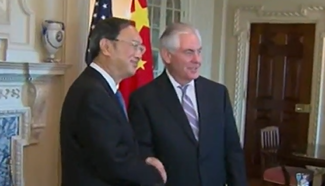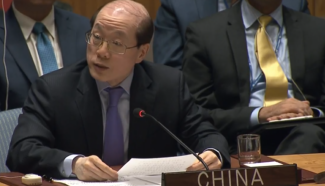ANKARA, March 1 (Xinhua) -- Turkey's referendum regarding granting president increased powers may deepen the already strained ties between Turkey and Germany, as the Turkish leader contemplates mobilizing his supporters in key European countries, according to Turkish experts.
Turkish citizens will vote on April 16 on a constitutional reform which would significantly increase Turkish president's powers.
Observers worry it may give the current dominant leader further unbridled freedom.
Ankara relaxed its restrictions concerning overseas voters in recent years, and with the substantial Turkish diaspora living in Germany, it has become an important destination for political campaigning.
Over 1.4 million registered voters reside throughout Germany and Turkey's Prime Minister Binali Yildrim addressed voters recently in the western city of Oberhausen to garner support for the controversial reform polarizing Turkish society.
No official statement has yet been issued regarding a possible visit by Erdogan to Germany, however his entourage implied that he is keen on organizing rallies in Germany while German politicians made it quite clear they do not support such a visit.
"The president addresses his citizens everywhere, why not in Germany as well? Why shouldn't he do the same in Germany through private events, where liberty of speech is protected?" demanded one of his aides, preferring to remain anonymous.
He also emphasized that Germany must rapidly extradite the numerous suspected individuals which Turkish authorities have accused of involvement in the attempted coup against Erdogan's regime last summer.
Ankara blames the U.S.-based Islamic cleric Fethullah Gulen of masterminding the coup through his Fethullah terrorist organization.
"We cannot have future positive relations with a country harboring traitors and coup orchestrators" insisted this source.
Ankara declared a state of emergency and launched a massive purge against the preacher's followers, with an unprecedented crackdown against opposition as well, criticized by the international community including Berlin.
Turkey's allies including Germany fear that president Erdogan is abusing the purges as a pretext to curtail dissent.
However, Germany also desperately needs its NATO ally to abide by a controversial deal to control the migrants' flow, particularly Syrians fleeing the war in their country, into Europe.
According to media reports, Ankara is especially interested in extraditing 40 Turkish military personnel, previous NATO employees, in addition to around 136 diplomats who fled to Germany, fearing possible punishment.
Other longstanding issues include Germany's parliament vote on recognizing the Armenian genocide during the ottoman empire.
Last but not least, Turkish authorities on Monday ordered the provisional detention of Deniz Yucel, a dual Turkish-German citizen, correspondent for the prominent German newspaper Die Welt, charging him with propaganda favorable toward a terrorist organization.
This incident follows reports in February that Turkish Islamic Union for Religious Affairs imams in Germany spied on Gulen followers.
German chancellor Angela Merkel swiftly reacted to the incarceration of the German journalist arrested on Feb. 18th, deeming the court's decision as "bitter and disappointing."
During a one-day-visit to Ankara last month, Merkel voiced public concern regarding the freedom of the press in Turkey as it has been negotiating its inclusion into the European union for over 10 years now.
Husseyin Bagci, international relations professor at the Middle East Technical University in Ankara, insisted that president Erdogan has the right to address his fellow citizens abroad.
"Germany can not say 'don't come here' to the head of state of an ally and friendly country," he added, also warning of a looming crisis if Erdogan uses the opportunity and meets with the Turkish diaspora only to highlight through his political campaign his goal to enhance his presidential powers.
Bagci, a renown expert on Germany affairs, also thinks Berlin will not extradite Turkish suspects because the German constitution forbids it.
Last July a German court banned president Erdogan from addressing his supporters by video during a rally of thousands in Cologne city, angering Ankara.
Sinan Ulgen, Chairman of the Centre for Economics and Foreign Policy Studies, thinks Turkey needs to convince its partners and allies of the validity of the extensive reaction against Gulen's network, to win their sympathy.
"Turkey needs to improve its image abroad to clearly display it is a viable state of law which can withstand any intervention from political authorities. And it's a difficult task during the current state of emergency," said Ulgen.
On the other hand Ulgen insists that German authorities must reconsider their stand on Erdogan's private visit given how highly they value free speech.
Irrespective of a possible presidential visit, experts share the opinion that strained bilateral relations need time and considerable effort from both sides to mend.
"Current bilateral relations are at an all time low," said professor Bagci.



